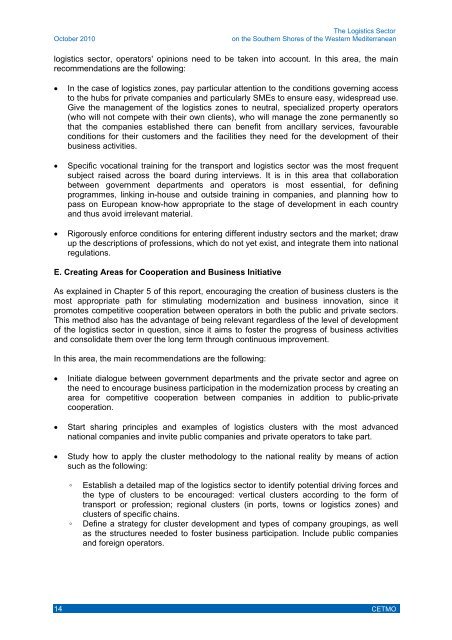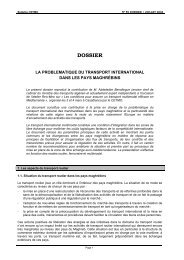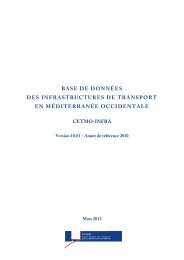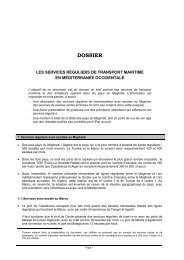The Logistics Sector on the Southern Shores of the Western ... - cetmo
The Logistics Sector on the Southern Shores of the Western ... - cetmo
The Logistics Sector on the Southern Shores of the Western ... - cetmo
- No tags were found...
You also want an ePaper? Increase the reach of your titles
YUMPU automatically turns print PDFs into web optimized ePapers that Google loves.
October 2010<str<strong>on</strong>g>The</str<strong>on</strong>g> <str<strong>on</strong>g>Logistics</str<strong>on</strong>g> <str<strong>on</strong>g>Sector</str<strong>on</strong>g><strong>on</strong> <strong>the</strong> Sou<strong>the</strong>rn <strong>Shores</strong> <strong>of</strong> <strong>the</strong> <strong>Western</strong> Mediterraneanlogistics sector, operators' opini<strong>on</strong>s need to be taken into account. In this area, <strong>the</strong> mainrecommendati<strong>on</strong>s are <strong>the</strong> following:• In <strong>the</strong> case <strong>of</strong> logistics z<strong>on</strong>es, pay particular attenti<strong>on</strong> to <strong>the</strong> c<strong>on</strong>diti<strong>on</strong>s governing accessto <strong>the</strong> hubs for private companies and particularly SMEs to ensure easy, widespread use.Give <strong>the</strong> management <strong>of</strong> <strong>the</strong> logistics z<strong>on</strong>es to neutral, specialized property operators(who will not compete with <strong>the</strong>ir own clients), who will manage <strong>the</strong> z<strong>on</strong>e permanently sothat <strong>the</strong> companies established <strong>the</strong>re can benefit from ancillary services, favourablec<strong>on</strong>diti<strong>on</strong>s for <strong>the</strong>ir customers and <strong>the</strong> facilities <strong>the</strong>y need for <strong>the</strong> development <strong>of</strong> <strong>the</strong>irbusiness activities.• Specific vocati<strong>on</strong>al training for <strong>the</strong> transport and logistics sector was <strong>the</strong> most frequentsubject raised across <strong>the</strong> board during interviews. It is in this area that collaborati<strong>on</strong>between government departments and operators is most essential, for definingprogrammes, linking in-house and outside training in companies, and planning how topass <strong>on</strong> European know-how appropriate to <strong>the</strong> stage <strong>of</strong> development in each countryand thus avoid irrelevant material.• Rigorously enforce c<strong>on</strong>diti<strong>on</strong>s for entering different industry sectors and <strong>the</strong> market; drawup <strong>the</strong> descripti<strong>on</strong>s <strong>of</strong> pr<strong>of</strong>essi<strong>on</strong>s, which do not yet exist, and integrate <strong>the</strong>m into nati<strong>on</strong>alregulati<strong>on</strong>s.E. Creating Areas for Cooperati<strong>on</strong> and Business InitiativeAs explained in Chapter 5 <strong>of</strong> this report, encouraging <strong>the</strong> creati<strong>on</strong> <strong>of</strong> business clusters is <strong>the</strong>most appropriate path for stimulating modernizati<strong>on</strong> and business innovati<strong>on</strong>, since itpromotes competitive cooperati<strong>on</strong> between operators in both <strong>the</strong> public and private sectors.This method also has <strong>the</strong> advantage <strong>of</strong> being relevant regardless <strong>of</strong> <strong>the</strong> level <strong>of</strong> development<strong>of</strong> <strong>the</strong> logistics sector in questi<strong>on</strong>, since it aims to foster <strong>the</strong> progress <strong>of</strong> business activitiesand c<strong>on</strong>solidate <strong>the</strong>m over <strong>the</strong> l<strong>on</strong>g term through c<strong>on</strong>tinuous improvement.In this area, <strong>the</strong> main recommendati<strong>on</strong>s are <strong>the</strong> following:• Initiate dialogue between government departments and <strong>the</strong> private sector and agree <strong>on</strong><strong>the</strong> need to encourage business participati<strong>on</strong> in <strong>the</strong> modernizati<strong>on</strong> process by creating anarea for competitive cooperati<strong>on</strong> between companies in additi<strong>on</strong> to public-privatecooperati<strong>on</strong>.• Start sharing principles and examples <strong>of</strong> logistics clusters with <strong>the</strong> most advancednati<strong>on</strong>al companies and invite public companies and private operators to take part.• Study how to apply <strong>the</strong> cluster methodology to <strong>the</strong> nati<strong>on</strong>al reality by means <strong>of</strong> acti<strong>on</strong>such as <strong>the</strong> following:◦ Establish a detailed map <strong>of</strong> <strong>the</strong> logistics sector to identify potential driving forces and<strong>the</strong> type <strong>of</strong> clusters to be encouraged: vertical clusters according to <strong>the</strong> form <strong>of</strong>transport or pr<strong>of</strong>essi<strong>on</strong>; regi<strong>on</strong>al clusters (in ports, towns or logistics z<strong>on</strong>es) andclusters <strong>of</strong> specific chains.◦ Define a strategy for cluster development and types <strong>of</strong> company groupings, as wellas <strong>the</strong> structures needed to foster business participati<strong>on</strong>. Include public companiesand foreign operators.14 CETMO
















